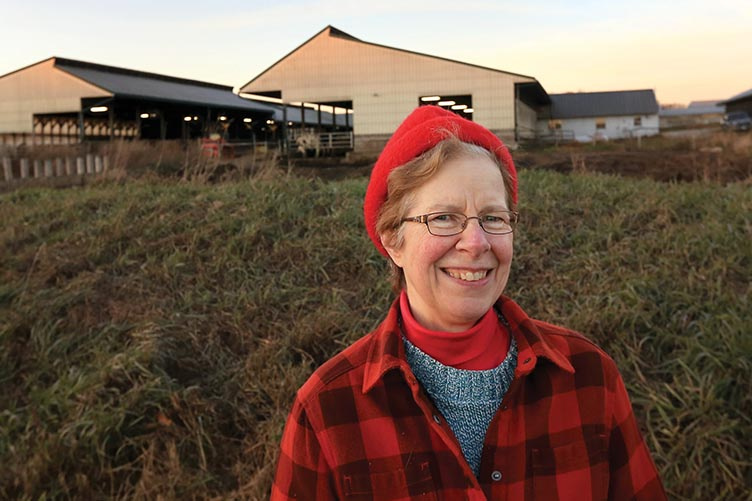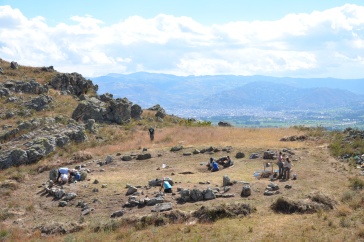
Lorraine Stuart Merrill ’73 (Photo: Ioanna Raptis)
Shortly after Lorraine Stuart Merrill ’73 was nominated as New Hampshire’s commissioner of agriculture in 2007, she took a phone call that caught her off guard: It was from a reporter who wanted to know how she felt about becoming the head of a dying industry.
“I was taken aback that people saw it to that extent, that it was that negative,” she recalls. “I realized that we really had a lot of work to do because that just wasn’t true.”
Merrill stepped down as commissioner in December 2017 after 10 years of tireless work to change the public perception of the industry. It was a productive decade by many measures, but she says there is still work to be done — and not just at the State House.
“I think it’s really going to be up to people to patronize local farms, to eat local foods, buy locally grown Christmas trees and plants and to support permanent conservation of farmland,” she says. “We’ve already lost so much farmland to development. We don’t have a lot to spare.”
Merrill understands the issue intimately. Her family’s Stuart Farm in Stratham was among the first in the state protected with an agricultural easement back in 1981. The working dairy currently has about 240 milking cows and 200 younger cows. Though her time on the farm was limited while she was commissioner, Merrill made a decision to start each morning helping with chores before she left for work.
“I watch the heifers for heats and know when they should get bred, move cows to the milking parlor, hoe stalls, help with calving,” she says. “It’s been good for my mental health and keeping me grounded in terms of what the job is all about.”
Merrill’s work as commissioner involved not only advocating for the industry but also developing budgets and working with the legislature — work for which her background in agricultural journalism came in handy, as she had a strong base of knowledge about the entire industry, not just dairy. In her last year, she was pleased when the legislature passed a $2 million dairy relief funding bill at the state level to prevent more closures of wholesale dairy farms after the 2016 drought.
Through it all, one of her favorite parts of the job was meeting farmers around the state. “The agricultural community is full of really terrific people, good people that it’s rewarding to work with and to try and help, to work for,” she says.
Aside from a year when she lived on campus at UNH, Merrill has called the Stuart Farm home since she was 10. Her family moved to the 270-acre farm after their Littleton, Massachusetts, dairy farm was leveled to make way for an interstate. But as a teenager, she wasn’t sure her future plans would involve working on the farm.
“I always said I was not going to marry a farmer or be a farmer,” Merrill recalls, “because they worked too hard.” Fate intervened when she met John Merrill ’72 during her freshman year. John, a liberal arts major, had fond memories of his grandfather’s farm in Maine. He asked Lorraine’s father if he could start working at the farm on weekends and vacations. They married the next summer, and by graduation, John had decided to work the farm, while Lorraine became a freelance writer.
Now that she’s back on the farm full time, Merrill plans to do more writing. She wants to revisit the book “Communities and Consequences: The Unbalancing of New Hampshire’s Human Ecology and What We Can Do About It” that she co-wrote with local demographer Peter Francese. She also hopes to spend more time with her family, including her three granddaughters.
“John’s in the barn at 4 o’clock in the morning every day milking cows; he could use a little bit more of a break,” she says of her husband. “I’m planning on getting him off the farm a little bit more.”
Originally published in UNH Magazine Spring 2018 Issue
-
Written By:
Lara Bricker '98 | Freelance Writer
















































